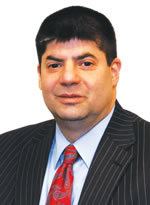Allegro
Union Justice: How the Local 802 Trial Board Works for You
Legal Corner
Volume 116, No. 5May, 2016

Harvey Mars, Esq.
Harvey Mars is counsel to Local 802. Legal questions from members are welcome. E-mail them to HsmLaborLaw@HarveyMarsAttorney.com. Harvey Mars’s previous articles in this series are archived at www.HarveyMarsAttorney.com. (Click on “Publications & Articles” from the top menu.) Nothing here or in previous articles should be construed as formal legal advice given in the context of an attorney-client relationship.
Almost every union has rules and regulations guiding the conduct of its members. By joining a union, members implicitly agree to be bound by its internal rules. For Local 802 members, these rules are codified in Article IV, Section 1 of the Local 802 constitution and bylaws. For the most part this section of the bylaws sets forth the behaviors and civilities that Local 802 members are expected to follow
As an attorney, I too am bound by ethical constraints, the violation of which could lead to me losing my license to practice law. Likewise, Local 802 musicians are subject to rules related to how they are expected to conduct themselves. Violation of the bylaws could lead to expulsion from Local 802, which would then mean that a musician couldn’t perform union jobs like Broadway or Lincoln Center. Expulsion is a harsh remedy that could severely impact a musician’s ability to make a living. Thus, due process protections are built into the Trial Board procedure.
A union’s internal regulations, however, are constrained by the Labor Management Reporting and Disclosure Act, a federal statute that establishes certain legal obligations that a union has towards its membership with respect to union operations and finances. The most important provision of this act is the Union Member Bill of Rights, set forth in Title I of that statute. Under the Bill of Rights section, all union members are guaranteed freedom of speech and the freedom to assemble with other members to express viewpoints and opinions without fear of reprisal. In essence, Title I parallels the U.S. Constitution’s Bill of Rights.
In the Supreme Court’s seminal decision, Scofield v. NLRB, 394 U.S. 423, 430 (1969), the court held that “[a] union is free to enforce a properly adopted rule which reflects a legitimate interest, impairs no policy Congress has imbedded in the labor laws and is reasonably enforced against union members who are free to leave the union and escape the rule.” Thus, this decision makes it clear that union internal rules can only be enforced against actual members of the union, not non-members. (In this case, “non-members” also includes those who have opted to pay “agency fees” to the union but who don’t want to be associated with the union otherwise. I’ve discussed agency fees in previous articles).
Within these constraints, a union is given a very wide berth to establish and enforce reasonable rules and regulations regulating the conduct of members. For example, the Local 802 bylaws contains provisions prohibiting a member from engaging in acts “injurious to the reputation of a fellow member’s calling as a musician” and “acts of bad faith or unfair dealing whose purpose would be injurious to the member, Local 802, the AFM, and in general the welfare of the musical profession. ” See Article IV, Section I, paragraphs (gg) and (ii).
Since 2002, these have been the two most cited provisions when members take up other members on charges. These paragraphs are a bit obtuse and lack defined contours, which possibly explains the reason why they have been cited so many times.
Local 802 bylaw violations are adjudicated by the Trial Board, a panel of elected Local 802 members who have the power to enforce the bylaws. (See page 2 of every issue of Allegro to find the names of the Trial Board members.)
A study of Local 802 Trial Board minutes reveals several interesting cases. One of the most fascinating trials I encountered involved the discipline of a member who was found programming a virtual orchestra machine device for a 2003 production of “42nd Street” at the Ford Theater. The charged party, after a trial was conducted, was found guilty of violating several sections of the bylaws. He was expelled from the union and ordered to pay a $5,000 fine. Of the several proceedings I reviewed, this was by far the harshest punishment levied on a member by the Trial Board.
While the internal disciplinary process is an efficient and effective way of maintaining the highest level of fair dealing and decorum within the union, members must realize the limitations of internal charges and the remedies that can be achieved by pursuing them. The Trial Board is not the “Local 802 small claims court.” Thus, it cannot adjudicate claims between members the way a civil court can. It is in essence a disciplinary body that can hand out penalties and fines against members if they are found guilty of violating the bylaws. Article V, Section 6 (d) limits the Trial Board to reprimanding, fining or expelling a member who is found to have violated the bylaws.
In essence, the Trial Board is the union’s criminal court, not a civil court. Members who are thinking about filing charges must think carefully about the objectives they wish to achieve. If the objective is to obtain money from another member for breaching a legal obligation (such as non-payment of a gig), the only body that has jurisdiction to achieve that result (assuming there is no contractual arbitration or mediation process applicable) is civil court, like small claims court. Filing an internal charge with the Local 802 Trial Board will only delay resolution of such a breach.
To file a charge against a fellow member, or to understand how to proceed if someone files a charge against you, contact the Office of the Recording Vice President at (212) 245-4802, ext. 111.
